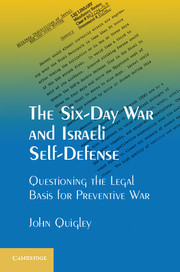Book contents
- Frontmatter
- Contents
- Preface
- Note on Official Documents
- Abbreviations
- The Six-Day War and Israeli Self-Defense
- Part One A War is Generated
- Part Two Cold War Togetherness
- Part Three The First Victim of War
- 9 Turkey Shoot
- 10 Cover-up in the Security Council
- 11 Security Council “in the Dark”
- 12 Cover-up in the General Assembly
- Part Four Rallying Round Self-Defense
- Part Five War Without Limit?
- Part Six Peace Sidelined
- Notes
- Bibliography
- Index
12 - Cover-up in the General Assembly
Published online by Cambridge University Press: 05 February 2013
- Frontmatter
- Contents
- Preface
- Note on Official Documents
- Abbreviations
- The Six-Day War and Israeli Self-Defense
- Part One A War is Generated
- Part Two Cold War Togetherness
- Part Three The First Victim of War
- 9 Turkey Shoot
- 10 Cover-up in the Security Council
- 11 Security Council “in the Dark”
- 12 Cover-up in the General Assembly
- Part Four Rallying Round Self-Defense
- Part Five War Without Limit?
- Part Six Peace Sidelined
- Notes
- Bibliography
- Index
Summary
Frustrated over the unwillingness of the Western powers to deal with the issue of aggression in the Security Council, the USSR asked the UN Secretary-General to call an emergency special session of the General Assembly. Per the USSR request, the session would “consider the question of liquidating the consequences of Israel's aggression against the Arab States and the immediate withdrawal of Israel troops behind the armistice lines.” This effort to involve the General Assembly enjoyed widespread support. Only the United States, Israel, and Botswana formally opposed the Soviet request. The United States objected that the Security Council was “still engaged in consultation looking towards further action by the Council.”
To have a chance of success in the General Assembly, the USSR needed some major powers. France seemed a likely candidate. As we saw, it said in the Security Council that Israel was the aggressor. So Chairman Kosygin, en route to New York for the emergency special session, dropped in on President de Gaulle in Paris. Kosygin put it to de Gaulle that “The essential question is to unite our efforts to punish the aggressor appropriately.” Consistent with his UN representative's statement to the Security Council, de Gaulle did not challenge Kosygin's assertion of Israeli responsibility. However, de Gaulle said the world would not be convinced: “You tell me that it is necessary to punish the aggressor and that Israel is the aggressor. It is true that it was the first to take up arms, but there are many who say that it could not do otherwise, that it was threatened, that it is a small country lost among the Arabs and that it had to clear itself. All that leads to a situation in which it would be difficult to rally the energy of the world to punish Israel.” De Gaulle spoke of ways to achieve an accommodation, fearing that if Israel remained in occupation, the Arab states would try to retake the territories by force, the United States would back Israel, and the USSR would back the Arabs. De Gaulle saw the superpower aspect as more worrying than the Arab-Israeli conflict itself: “The Arabs are not much, and Israel is nothing at all, but the rivalry between the Americans and the Russians is the main thing.”
- Type
- Chapter
- Information
- The Six-Day War and Israeli Self-DefenseQuestioning the Legal Basis for Preventive War, pp. 101 - 112Publisher: Cambridge University PressPrint publication year: 2012



